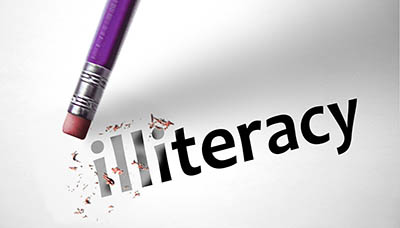 The U.S. Department of Health & Human Services has a handy fact sheet all about “Health Literacy”, starting with a definition:
The U.S. Department of Health & Human Services has a handy fact sheet all about “Health Literacy”, starting with a definition:
“Health literacy is the degree to which individuals have the capacity to obtain, process, and understand basic health information and services needed to make appropriate health decisions.”
That ability to obtain — and understand — the necessary facts makes all the difference in how people choose to manage their health options.
The New York Times recently reported on the rising threat of health illiteracy in our country. And the numbers only get worse with age. In fact, only 3 percent of older adults qualify as having “proficient” health literacy.
Why Is It Harder For the Elderly?
There are a number of factors that contribute to the increase of health illiteracy in our aging population.
- Complicated Information — Medical information is usually shared in technical, scientific language that can even confuse professionals.
- Use of Jargon — Medical professionals sometimes fall back on industry jargon without explaining the meaning.
- Stressful Conditions — When people are anxious, it’s even harder for them to make sense of the information being shared.
- Cultural Differences — Sometimes there’s a language barrier that keeps people from fully understanding instructions. Even the most competent English speakers may not be able to follow the specifics of a prescription.
- Cognitive Impairment — Declining brain function can have disastrous consequences when dosages are misunderstood or completely forgotten.
I’ve often blogged about age-related cognitive decline and it’s ill effects.
Too often, I see health illiteracy in clients I’ve known for many years. When we talk, I can tell they’re not the person I originally met. Instead, I hear fear, frailty and confusion. I worry for their ability to make safe choices for themselves.
One thing left out of the article is the decreasing access to family and community support. This is the elephant in the room. No amount of technology can replace the caring touch of another. I believe our increasingly isolated lifestyles are a major cause of loneliness, depression, fear, poor health outcomes, and health illiteracy. And it only gets worse as we age.
Our increasingly stressed medical system is doing it’s best to counteract the rise in health illiteracy, but this is an uphill battle. I’m not confident they’ll win.
Plan For Your Future Health Literacy
You can avoid health illiteracy well in advance. We are not going to regain our supportive communities from our grandparents’ generation. Make sure you have access to care and genuine concern when you need it. Plan for it and pay for it. Long term care planning in advance is essential.
To begin exploring your own options, click here to receive your free, no-obligation quote for long term care insurance coverage.


 Thanks for visiting my site! I like hearing from you!
Thanks for visiting my site! I like hearing from you!
Leave a Reply